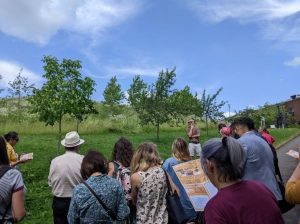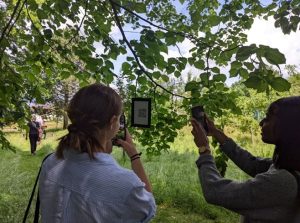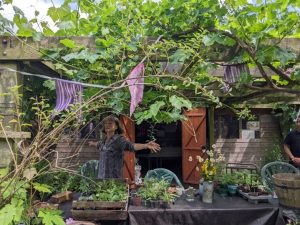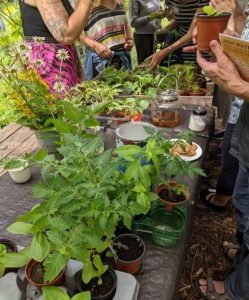Charlotte Smith (year-3 Student Representative), Sheila Njogu, Yannan (Jessica) Jin (Programme Leader for BSc Nutrition)
In this June, an incredible opportunity arose for Nutrition students at De Montfort University – an invitation to attend the second Leicestershire Food Summit, hosted by Loughborough University. We joined the event at the Holywell Park Conference Centre at Loughborough University for a full day of talks, tours and workshops – see photo enclosed with all of us in.
Following on from the success of the first Summit last year, the conference was themed ‘Pasture to Plate’, which focused on tightening strategic planning to shape and develop a sustainable food infrastructure within Leicestershire.
The event was attended by representatives from each stage of the local food system, including academia (including DMU representatives), farming, recycling, public health, local government, retail, community food growing, environmental health, food co-operatives, community supported agriculture, food procurement, the charity sector, and so on.
The purpose of our attendance was to learn how we, as nutritionists, can contribute to the regional and national agenda of achieving food sustainability and nutrition security through engaging in different activities and working with different actors within the food system.
Key speakers from industries and academia highlighted the current environmental, economic and diet-related challenges facing the UK, followed by sharing their vision and strategies put in place to tackle those issues.
Long Clawson Dairy, for example, pointed out that 15-30% of the UK greenhouse gas emissions come from food. They are striving to meet the target of reducing carbon emissions by 30% up to 2032, through continued innovative works on feed, fertiliser and fuel. Some measures are being taken including reducing the import of soy used for cows’ feed from South American, to cut down the carbon footprint, replacing the use of inorganic fertiliser with organic slurry fertiliser, as well as introducing more means of renewable fuel production, such as using wind turbines and anaerobic composting for biogas. In light of food waste, ENVA, the leading recycling and resource recovery specialist company, provided an insight into the latest food waste scale and potential management solutions, that aim to reduce the environmental impact of our daily food waste. It is shocking to know that for every 100 potatoes grown in the UK, only 25 get eaten. Waste food generates millions of tonnes of methane, a highly damaging greenhouse gas. Across Leicestershire, the county council spends £123 million each year processing household food waste. Their vision is ‘to protect and preserve the world’s finite resources’, which we would agree comes as a priority for the food sustainability agenda! From Long Clawson and ENVA, we headed to BeanMeals, to learn more about the University of Oxford led project that looks at getting higher nutrition UK grown beans into school meals, with taste trials ongoing at six Leicester and Leicestershire primary schools. Led by Dr Monika Zurek from Oxford University, the talk weaved us through the complexity of the food system, innovative systemic approach the project is taking to transform the current UK food systems, and even featured the presentation talents of three pupils of Narborough’s Greystoke Primary School as the final highlight!
The afternoon was packed with our participations in different thematic workshop discussions. Charlotte Smith (the year-3 student rep) joined the workshop titled ‘Sustainable and Incredible Edible Loughborough – Bridging the Gap between Food Poverty and Agroecological food’. She shared a piece of reflection based on her own learning experiences and her later research on the workshop topic, after the event, as follows. ‘I ended the day with a lively and thought-provoking discussion in the “Bridging the Gap” workshop. Here we discussed how we could bridge the food inequality gap; in particular, the obstacles that certain councils and communities face when trying to implement change, but also the successes of community projects, such as Incredible Edible. Incredible Edible promotes community gardens and building connections based on food! The team have even secured a proposal to amend the government’s Levelling up Bill to include the Right to Grow, which will be debated in parliament. This will give the community the right to grow their own food on unused plots, without the need to appeal to the local authority, thereby increasing the accessibility and availability of growing land for the local people. More can be read about their amazing work and accomplishments here: https://www.incredibleedible.org.uk.’
Sheila and Dr Jin joined the workshop titled ‘Healthy and sustainable diet with the reflection on sustainable planting’, featuring Dr Monika Zurek from Oxford University and Mr Alex Gray of SMB College Group’s Brooksby Campus. The discussions with other participants were revolved around issues and barriers of having a healthy diet and food system in Leicestershire’. Sheila reflected that ‘It was very astonishing to find out that the main way to promote healthy eating isn’t to import more healthy food options into supermarkets which is what I originally thought but it was education! Targeting at the younger generation will increase the likelihood for the children to be conditioned to have healthier eating habits from a young age, alongside habits of planting their own foods. This would lead to a huge increase in sustainable planting and a healthy and sustainable diet.’
Our experience at the event was further enriched with a lovely sun-bathed and guided tour to the Fruit Routes and Community Farming on Campus at Loughborough University.
Apple trees and grapes, apricots and pears growing on the sides on university buildings
Interactive QR codes placed in trees in various locations along the ‘Fruit Route’ – these can be scanned as you journey through, and they will provide extra information about a certain plant or topic.
We then headed to the Loughborough community garden that has been run by student volunteers from the Student’s Union and other volunteering communities within and outside the University on Friday afternoons. The gardening activities are followed by ‘social’ time spent on cooking and eating the literal fruits of their labour (mainly salads, jams and chutneys)! The head gardener Martha Wörsching very kindly and generously provided various herbs and plants that were available in the garden to visitors on the day!
The whole-day event brought a rich bundle of learnings, inspirations and fun, packed with good memories, to all of us! As nutritionists, promoting healthy and sustainable eating to benefit people and the planet is our ultimate goal of practice. Upon reflections, we are eager to start the ‘Sustainable Move’ at DMU by working on food waste and sustainable growth and food sharing on campus, in close collaboration with our sustainability teams to support our target-driving for UN SDGs.
Finally. we would like to sincerely thank Leicestershire County Council and DMU for inviting us to join this remarkable event.
Charlotte, Sheila and Dr Jessica Jin.
Nutrition DMU.
July 2023






